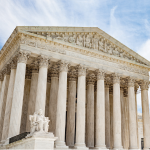The past few weeks have produced significant uncertainty in the U.S. political and legal systems in light of two recent Supreme Court decisions. Trump v. United States and Loper Bright Enterprises v. Raimondo have garnered substantial media attention and concern. One is more directly linked to regulatory advocacy, but both have significant implications for executive power and deserve some honest analysis.
We will begin with Trump v. United States, the Supreme Court’s decision on presidential immunity. Although this case may seem unrelated to health advocacy, it is probably the one most people have heard about. Additionally, its implications are linked to Loper Bright Enterprises v. Raimondo. The decision in Loper overturned Chevron deference, a four-decade-old standard for evaluating the rulemaking authority of administrative agencies. By exploring the nuances of these decisions, it becomes apparent that there are reasons to be concerned—but they may not be the reasons stressed in news reports.
Trump v. United States
This decision has received a great deal of media attention, with some news outlets and pundits going so far as to declare that this decision has made the president a king. This kind of hyperbole is great for clicks and viewership, but does it accurately describe the Supreme Court’s decision? I would argue that it emphatically does not. The decision carved out presidential immunity for actions the president makes when exercising his constitutional duties or during an official act of the president. Notably, it does not provide immunity for any other actions of the president. It also does not expand the powers of the presidency. The president is still limited to the legal and constitutional powers of the office.
This kind of immunity is not unprecedented. Members of Congress have long enjoyed immunity from prosecution for actions taken during legitimate legislative activity. This immunity has been extended to state and local legislators. Acts not related to the legislator’s duties or without lawful authority are not covered by legislative immunity. A somewhat comforting fact is that there is a long history of legislators from both parties being prosecuted for illegal acts, such as taking or soliciting bribes.
The decision in Trump v. United States does not foreclose the possibility of a president being prosecuted for acts before they have assumed office, after they have left office or for acts outside the scope of their constitutional or official duties. Despite what you may hear in the media, we do not have a king—at least, not yet.


